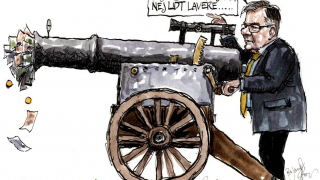Toward a logic of Atlanticism from Palmerston to the present
To understand the logic of Atlanticism, including modern Atlanticism, it is sufficient to consider an illustrative example: the events of the 1830s. From 1830 to 1841 the levers of world Atlanticism were actually in the hands of Palmerston, who had the nickname Palm (PAM) - the Pan-Atlantic Wizard. Being formally only a foreign minister under the false prime ministers Gray and Melbourne (an Australian man and city), Palmerston actually determined the entire British geopolitics during these 11 years (excluding a very brief hiatus in 1834-35, when King William IV appointed for the last time in history a prime minister, namely Wellington, against the will of Parliament, but Palmerston again did his own thing and put the king under his belt).











